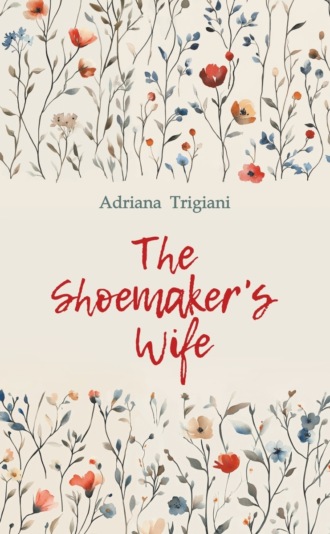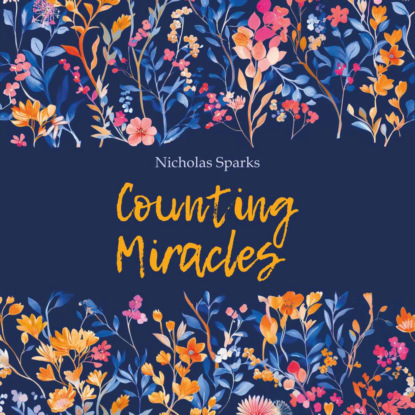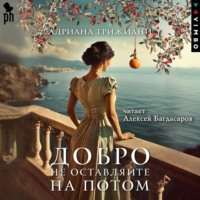
Полная версия
The Shoemaker's Wife / Жена башмачника. Книга для чтения на английском языке
When spring came, the ice-covered cliffs below the peak thawed, turning bright green as mugo pine[29] and juniper trees sprouted new branches. The deep gorge of the valley filled with fields of yellow buttercups. The village women gathered herbs to make medicine: chamomile for tea to soothe nerves, wild dandelion for blood curing, fragrant peppermint for stomach ills, and golden nettle to bring down fevers.
The Passo Presolana was the lone ribbon of road connecting Schilpario to Vilminore di Scalve and down the mountain to the city of Bergamo. It had been built in the eleventh century, a rustic one-way path to be traveled on foot. Eventually the road was widened to accommodate a horse and carriage, but only in warm weather, as it was treacherous in winter.
Marco Ravanelli knew every cleft and curve of the pass, every natural stone overpass that provided shelter, each small village along the way, every farm, river, and lake, as he had accompanied his father, who ran a horse and carriage service, up and down the mountain since he was a boy.
Marco, the coachman of Schilpario, was slim and of medium height, with a thick black mustache that offset his handsome features. As he plunged two long sticks into the ice, he steadied himself on the path between the stone house he rented and the barn that he owned. He was careful not to fall, as he couldn’t afford a broken leg or any sort of injury. He was thirty-three years old and responsible for a wife and six children, the youngest, Stella, just born.
Enza, his eldest, followed behind him, plunging her own set of sticks into the ice to steady herself. Enza had just turned ten, but she could do anything a woman twice her age could do and perhaps better, especially sewing. Her small fingers moved deftly and with precision, creating small, nearly invisible stitches on straight seams. Her natural talent was a marvel to her mother, who couldn’t sew nearly as fast.
Enza’s chestnut brown hair had not been cut, and it grazed her waist in two shiny braids that lay flat and neat like reins. Her heart-shaped face resembled her mother’s, full cheeks, skin the color of fresh cream, and perfectly shaped lips with a defined Cupid’s bow[30]. Enza’s light brown eyes sparkled like amber buttons.
The eldest daughter in a family with many children never has a real childhood.
Enza had learned how to hitch a horse as soon as she grew tall enough to reach the carriage. She knew how to make a paste from chestnuts for pies, pasta dough from potatoes for gnocchi[31], how to churn butter, wring a chicken’s neck, wash clothes and mend them. Whenever Enza found time to play, she used it to sew. Fabric was expensive, so she taught herself to dye cotton muslin[32] to create colorful designs that she would then sew into garments for the family.
When summer came, she picked blackberries and raspberries and made dyes from their inky pulp. She pleated and pinched the coarse cotton, painting the dyes onto the fabric, and then let them dry in the sun, setting the colors. Plain cotton muslin became beautiful as Enza dyed it into shades of lavender, delicate pink, and slate blue. She decorated the colorful fabric with embellishments and embroidery.
There were no dolls to play with, but who needed one when there were two babies in cribs to care for, plus three more children in the middle, one crawling and two more walking, as well as plenty of tasks to occupy the dark winter days?
The stable was cold, so Marco and Enza threw themselves into their chores. As Papa brushed Cipi, their beloved horse, Enza polished the bench on the governess cart. The cart was smaller than a regular carriage, seated only two, and was painted a sophisticated black, to emphasize the graceful curves of its design. Enza dusted the seat with a clean moppeen, careful to polish the trim.
Working people in service to the wealthy must pay particular attention to details. Paint must be lacquered, gold trim must dazzle, every notch, joint, and button of brass must shine. The stature and social position of the customer is reflected in the gloss that results from the servant’s elbow grease[33]. It’s what the wealthy pay for; it’s what they require. Marco taught Enza that everything must gleam, including the horse.
Enza placed the lap robe[34] she had made of sturdy gold cotton on one side and brown suede on the other, on the passenger side of the cart. It would keep the paying customer warm.
«I don’t think you should go, Papa.»
«It’s the only job I’ve been offered all winter.»
«What if the hitch snaps?»
«It won’t.»
«What if Cipi falls down?»
«He’ll get back up.»
Marco checked the suspension on the cart. He took an oilcan and greased the springs.
«Here. Let me.» Enza took the oilcan from her father and slipped under the cart to oil the gears. She was careful to give a few extra squirts, so the cart could take sudden turns and jolts on the icy mountain road without toppling.
Marco helped her out from under the cart. «The snow is always the worst on the mountain. By the time I get to Vilminore di Scalve, it will be a dusting. There’s probably no snow at all down in Bergamo.»
«What about the rain?»
Marco smiled. «You worry enough for your mother and me.»
«Somebody has to.»
«Enza.»
«Sorry, Papa. We have enough flour until spring. A little sugar. Lots of chestnuts. You don’t have to take this job.»
«What about the rent?»
«Signor Arduini can wait. All he’ll do with the money is buy more dresses for his daughter. Maria has enough.»
«Now you’re going to tell the richest man in town how to spend his money?»
«I wish he’d ask me. I’d tell him plenty.»
Marco tried not to laugh. «I’m getting three lire to take the passenger down the mountain.»
«Three lire!»
«I know. Only a fool would turn down three lire.»
«Let me go with you. If you have any problems, I’ll be there to help you.»
«Who will help your mother with the children?»
«Battista.»
«He’s nine years old, and a bigger baby than Stella.»
«He just likes to have fun, Papa.»
«That’s not a quality that gets you far in life.»
«Eliana is helpful.»
«She’s not strong,» Marco reminded her.
«But she’s smart; that should account for something.»
«It does, but that doesn’t help your mother with the chores. Vittorio and Alma are small, and Stella is nursing. Your mama needs you here.»
«All right. I’ll stay. How long do you think you’ll be gone?»
«One day down the mountain. I’ll stay the night, and one day up the mountain.»
«Two whole days —»
«For three lire,» Marco reminded her.
Marco was ambitious. He had drawn up plans to build a deluxe carriage with three benches to transport the summer tourists who craved the quiet of the mountain summers, with their cool nights and sunny days. The pristine alpine lakes were popular for swimming. Tourists could take the healing waters in Boario if they wished, sun on the beach of the Brembo River or take the mud baths of Trescore. The new carriage would take the tourists anywhere they wanted to go! Marco pictured a modern carriage with a canopy of bold black-and-white stripes with brass bindings, while silk-ball fringe along the edge would provide a touch of glamour. Giacomina and Enza would make corduroy cushions for the benches, turquoise blue.
Marco hoped to earn enough money to finally make the Arduinis an offer on the old stone house. The rent was high, but it was close to Cipi’s barn, where the carriage and equipment were stored. The Ravanellis couldn’t live in the barn. They needed the house.
Signor Arduini was getting older; soon his son would take over as padrone. The wooden box filled with folded parchments of surveyed land lots[35] in Schilpario would be handed down and managed by the next generation of Arduinis. There had been signs that Marco should seriously consider buying the house. Sometimes after Marco delivered the rent, Signor Arduini would implore him to buy their house before his death, before his son took over and a potential sale might be off the table for good[36]. It was Signore’s desire to sell that had motivated Marco to expand his business; the present carriage would not provide the profit needed to buy the house.
Buying the house on Via Scalina was Marco’s dream for his family.
Marco arrived in Vilminore on time. Across the piazza, he saw his customer waiting for him, a nun by her side. Resting on the ground next to her was a small brown duffel. Caterina’s blue coat stood out against the pink and gray of winter. Marco was relieved that his customer had been waiting for him, as arranged. Lately, most of his fares had not honored their appointments, a sign of how dire the poverty in these mountains had become, as travelers attempted to pass on foot.
Marco guided Cipi across the piazza to the entrance of San Nicola, then jumped off his perch, greeted the nun, and helped Caterina Lazzari into the governess cart. He placed her suitcases inside the drop box by her feet and flipped the cover shut, draped the lap robe over her blue coat, and secured the canopy.
Sister Domenica handed him an envelope, which he tucked into his pocket. He thanked her before climbing into the cart on the driver’s side. The nun went back inside the convent.
As Marco guided the horse across the piazza, he heard a boy calling out for his mother. Caterina Lazzari asked Marco to stop as Ciro, out of breath, ran up to the side of the carriage. She looked down at her son. «Go back inside, Ciro. It’s cold.»
«Mama, don’t forget to write to me.»
«Every week. I promise. And you must write to me.»
«I will, Mama.»
«Be a good boy and listen to the sisters. It won’t be long until summer.»
Marco snapped the reins and guided Cipi down the main street to the mountain road. Ciro watched his mother go. He wanted to run after the cart, grab the handle, and hoist himself up on to the seat, but his mother did not look back at him, nor did she lean over the side, holding out her hand, beckoning him to join her, as she had done on every carriage ride, train trip, or swing as long as he could remember.
All Ciro could see was his mother’s choice to ride away from him, to leave him there like a broken chair on the side of the road waiting for the junkman. As she rode off, he saw the frame of her collar and the back of her neck, straight as the stem of a rose. Soon she became a blue blur in the distance as the cart turned toward the entrance road to the Passo Presolana.
Ciro’s chest heaved when she disappeared from view. He longed to open his mouth and cry out for his mother, but what good would that do? Ciro hadn’t learned the difference between sadness and anger. He just knew that he would have liked to smash everything in sight – the statuary, the vendor’s bin, and the windows in every shop on the colonnade.
Ciro was angry about every bad decision his mother had made since his father left, including selling everything Papa owned, including his gun and his belt buckle. He was angry that Eduardo was tolerant in the face of every setback and went along with everything their mother said. And now Ciro was furious that he had to live in a convent, which for him, was like asking un pesce di abitare in un albero (a fish to live in a tree). Nothing his mother had done made sense. Her explanations were not satisfactory. All he knew and had heard was that he must be good, and who decides what is good?
«Come inside, Ciro.» Eduardo held the door open.
«Leave me alone.»
«Now, Ciro.» Eduardo stepped outside, closing the door behind him. «I mean it.»
Eduardo’s tone ignited Ciro’s temper like a match to dry kindling. He was not Ciro’s mother or father. Ciro turned to his brother and tackled him. Eduardo’s head cracked against the bricks as Ciro pummeled him with his fists. Ciro heard the solid landing of the blows, but didn’t hold back, only hit his brother harder in his rage. Eduardo curled up into a ball to protect his face and rolled from his back onto his knees, crying out, «It won’t make her come back.»
Ciro’s strength gave out, and he fell onto the ground next to his brother. Eduardo held his knees tight as Ciro knelt and placed his face in his hands. He didn’t want Eduardo to see him cry. Ciro also knew if he began to weep, he wouldn’t stop.
Eduardo stood and pulled down the short cuffs on his shirt. He smoothed his pants and lifted them up by the waist. He patted his hair back into place. «They’ll throw us out if we fight.»
«Let them! I’m going to run away. I’m not going to stay here.» Ciro’s eyes darted around[37] as he planned his escape. There were at least six ways out of the piazza. Once he was free of this town, he could go way up the mountain to Monte Isola[38], or a few miles down the road to Lovere[39]. Someone might take him in.
Eduardo hung his head and began to cry. «Don’t leave me here alone.»
Ciro looked at his brother, the only family he had, and felt worse for him than he did for himself. «Stop crying,» he said.
The full morning sun was up, the shopkeepers were opening their doors, lifting their shades[40], and rolling their carts on to the colonnade. Vendors dressed in shades of flat gray, the color of the low stone wall that encased the village, pushed hand carts painted bright red, yellow, and white filled with bins of polished walnuts, silver pails filled with braids of fresh white cheese in clean, icy water, spools of colorful silk thread on wooden dowels, fresh loaves of bread in baskets, packets of herbs in linen sacks for poultice – all manner of needs for sale.
The presence of the others helped Eduardo gain control of his emotions. He dried his tears with his sleeve. He looked out to where the main road curved to connect to the pass, but it held no meaning for him; it wouldn’t lead him or his brother out of their situation. The morning mist had lifted, and the air was so cold that Eduardo could barely breathe. «Where would we go?»
«We could follow Mama. We could change her mind.»
«Mama can’t take care of us right now.»
«But she’s our mother,» Ciro argued.
«A mother who can’t take care of her children is useless.» Eduardo held the door open for Ciro. «Come on.»
Ciro entered the convent with his heart heavy with need for his mother’s embrace and a deep shame for having hit his brother. After all, their tenure at San Nicola wasn’t Eduardo’s choice, and the events that had led them there were not his fault either.
Maybe these nuns could be of some use, Ciro thought. Maybe they could pray their mother back before the summer – Ciro would ask them to offer up their rosaries[41] for her. But something told him that all the glass beads on the mountain wouldn’t bring Caterina home. No matter how Eduardo might reassure him, Ciro was certain he would never see his mother again.
Ciro cried himself to sleep[42] that night, and in the morning found Eduardo sleeping on the floor next to him, as the cots provided by the nuns were too small to hold both of them. Even when he grew to be a young man, Ciro would never forget this small act of kindness, which Eduardo would repeat night after night for months. Eduardo’s love was the only security Ciro would ever know. Sister Teresa would feed them, Sister Domenica would assign them chores, and Sister Ercolina would teach them Latin, but it was Eduardo who would look out for Ciro’s heart and try to make up for[43] the loss of their mother.
Chapter 2. A red book
Un Libro Rosso
Halfway down the mountain, in the early afternoon, Marco stopped to rest Cipi on the outskirts of Clusone[44]. He helped Caterina down from the cart. She thanked him – the first time she had spoken directly to him since the trip began that morning.
Marco opened a tin and offered her a fresh, crusty roll, thin slivers of salami, and a bottle of sweet soda. Caterina took a handkerchief tucked inside her sleeve and placed the bread and salami on it while Marco opened the bottle of soda. She took a small bite of the biscuit and chewed slowly.
Marco had been a coachman since he was a boy. His father had taught him how to take care of horses, shoe and feed them, build and maintain equipment, and serve customers, and he still followed his father’s advice: The coachman must know his place and speak only when spoken to. Half the negotiated fare is collected at the beginning of the trip, the balance at the end. A coachman should engage a strong horse and provide a clean carriage with the feed stored out of sight. There should be several rest points on a long journey, announced to the customer beforehand. Food and drink should be provided, as well as pipe tobacco, snuff, cigarettes, and matches. The coachman should be familiar with the route, and know the location of way stations in case of illness or accident. Once the destination is reached, the coachman is responsible for the secure delivery of the customer’s belongings.
This particular afternoon, Marco forgot the rule about conversing with passengers. He was thinking of his children, and knowing that Signora Lazzari was also a mother, he sensed that she might be simpatico. The little boy she’d left behind tore at Marco’s heart. Caterina was stoic until the carriage reached the cleft of the pass. It was only then that she wept.
«I told my daughter that it wouldn’t snow beyond Valle di Scalve.» Marco looked out over the expanse of the valley, frozen over in white ice, the hills curved like sculpted marble. The road ahead seemed clear; the only danger Marco foresaw was the occasional patch of black ice.
«You were right.» Caterina took the biscuit and broke it in half, giving the other half to Marco.
«Thank you,» he said.
She took a bite.
«Do you have a daughter?» Marco asked.
«No. Two boys. You saw Ciro, and there’s Eduardo. He’s a year older.»
«Was he at the convent too?»
She nodded that he was. Marco looked at Caterina, roughly his own age, and decided that she was taking the years better than he. The early mornings tending the animals, the long days working in the iron ore mine for little return, and the constant anxiety about how to provide for his family had made Marco feel and look older than his age. There had been a time when a beautiful woman like Caterina could turn his head[45]. In the right circumstances, she still could.
«I always wanted a daughter,» she admitted.
«My eldest is a good girl. She helps her mother and me, and she doesn’t complain. Enza is ten years old, and already so wise. I have two sons and three more girls.»
«You must have a farm.»
«No, no, just the cart and the horse.»
Caterina couldn’t imagine why Marco would have six children unless he needed to put them to work on a farm. A couple of strong boys was all he would need to keep a carting business with a livery stable going. «You must have a good wife.»
«A very good wife. And your husband?» Marco realized that he was asking very personal questions, inappropriate for a lady like Caterina. «I only ask because you left your boys at the convent,» he explained.
«I am a widow,» Caterina offered, but she did not elaborate.
Caterina’s station in life – once as the daughter of a prominent family, then as a young wife and mother, and now as a widow – required her to hold herself to standards of decorum. A lady didn’t confide in a coachman, even when she may very well have been even poorer than he.
«The sisters of San Nicola are very kind,» Marco said.
«Yes, they are.» Caterina was sure he was referring to the envelope that Sister Domenica had given to him, which paid for this trip. For Caterina, the nuns had been more than generous. They had taken the boys on short notice[46] and made her arrangements as well.
«Your boys should do very well there.»
«I hope they will.»
«Many years ago, when I was a boy, the nuns of San Nicola gave me a remembrance card. I still carry it with me.» Marco reached into his pocket and handed her a small illustrated card trimmed in gold.
«A talisman.» Caterina’s father used to print cards like this one, depicting the Holy Family protected by angels. They were distributed on feast days or at funerals, often with the name of the dead embossed upon the back. Her eyes filled with tears at the memory of the boxes of them in her father’s print shop. «I understand why this gives you comfort. Are you a believer?»
«Yes, I am,» Marco said.
«Not me. Not anymore.» Caterina handed the card back to Marco. If only the image on the card were true. She had long given up on the angels and saints. Their power to soothe her had died with her husband. She climbed back up into the carriage without Marco’s help, suddenly impatient with the length of the journey. «How much longer is the trip?»
«We’ll be in Bergamo by nightfall.»
They continued down the Passo Presolana, over Pointe Nossa, through Colzate, past Vertova, for a final rest stop in Nembro, where Signora Lazzari changed out of her traveling clothes and into a proper dress before arriving in Bergamo. Marco surmised the appointment Signora was to keep must be important. She fixed her hair, her hat, and her gown, which once had been stylish but now was worn along the hem and cuffs. The coachman and his customer did not exchange another word.
Enza closed the wooden shutters on the window at the front of the house. As she threw the latch, cold wind whistled through the slats. With the hearth crackling behind her, stoked with wood and a few pieces of coal, and the laundry kettle about to boil, the kitchen was filled with a warm and welcome mist.
This was Enza’s favorite time of day, when night had fallen in Schilpario and the children were in bed. Baby Stella slept in a woven basket draped with a soft white blanket. Her face looked like a pink peach by the firelight.
Giacomina, Enza’s mother, a capable woman with a sweet face and soft hands, stirred a pot of milk on the fire. She wore her long brown hair with a center part and two braids, wrapped neatly in a bun at the base of her neck.
Giacomina stooped over the flame until the milk foamed and placed the pan on a stone trivet. She lifted two ceramic cups from the shelf, placing them on the table, dropped a pat of butter in each cup, and poured the milk on top. Reaching up to pull a small bottle of homemade brandy from the shelf, she put a teaspoon in her cup, a couple of drops in Enza’s. She stirred the mixture and ladled the foam left in the pan on top.
«This will warm you up.» Giacomina gave Enza her cup. They sat down at the end of their dining table, made from wide planks of alder, with matching benches on either side. How Enza wished she could buy her mother a dining room suite[47] made from polished mahogany with fabric seats, and a new set of china[48] to dress the table, just like Signora Arduini had at her house.
«Papa should be back by now.»
«You know the trip back up the mountain is always longer.» Mama sipped her milk. «I’ll wait up for him. You can go to bed.»
«I have wash to do.» Enza shrugged.
Giacomina smiled. The laundry could wait, but Enza wanted an excuse to be awake when her father returned. It was always the same. Enza couldn’t sleep until all the members of the family were safe inside, asleep in their beds.
«Mama, tell me a story.» Enza reached across the table and took Giacomina’s hand. She spun her mother’s gold wedding band[49] around her finger, feeling the grooves of the tiny carved rosebuds etched into the gold. Enza believed it was the most beautiful piece of jewelry in the world.
«I’m tired, Enza.»
«Please. The story of your wedding day.»
Enza had heard the love story so many times that her own mother and father had become as magical to her as figures in her favorite book, drawn in exquisite detail and eternally young in the telling. Enza studied the photograph of her parents on their wedding day as if it were a map. In a sense it was, as they were creating a destination, a life together. The bride and groom sat stiffly in two chairs. Mama held a bouquet of mountain asters[50] tightly as Papa rested his hand on her shoulder.
«Your papa came to see me one Sunday when Iwas sixteen and he was seventeen,» Giacomina began the familiar story. «He drove the governess cart – at that time, it belonged to his father. It was painted white in those days, and that morning, he had filled it with fresh flowers. There was barely room for your papa on the bench.»





